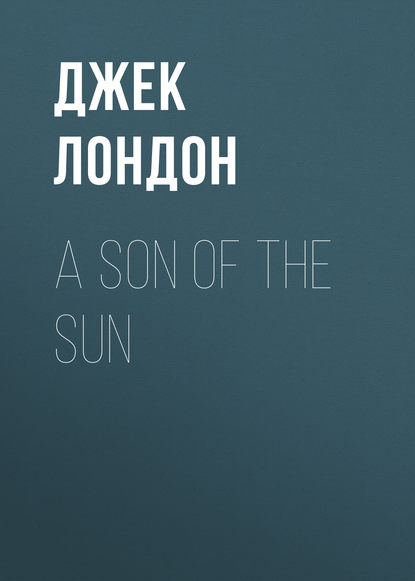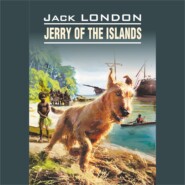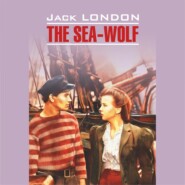По всем вопросам обращайтесь на: info@litportal.ru
(©) 2003-2024.
✖
A Son Of The Sun
Настройки чтения
Размер шрифта
Высота строк
Поля
“Now you’re talking like a man,” he cried. “The only way you’ll ever lick me is to become a man. And then, maybe – ”
He paused in the hope that the other would catch the suggestion. Aloysius groped for it, and, abruptly, something akin to illumination shone in his eyes.
“And then I won’t want to, you mean?”
Grief nodded.
“And that’s the curse of it,” Aloysius lamented. “I really believe I won’t want to. I see the point. But I’m going to go right on and shape myself up just the same.”
The warm, sunburn glow in Grief’s face seemed to grow warmer. His hand went out.
“Pankburn, I love you right now for that.”
Aloysius grasped the hand, and shook his head in sad sincerity.
“Grief,” he mourned, “you’ve got my goat, you’ve got my proud goat, and you’ve got it permanently, I’m afraid.”
VI
On a sultry tropic day, when the last flicker of the far southeast trade was fading out and the seasonal change for the northwest monsoon was coming on, the Kittiwake lifted above the sea-rim the jungle-clad coast of Francis Island.
Grief, with compass bearings and binoculars, identified the volcano that marked Redscar, ran past Owen Bay, and lost the last of the breeze at the entrance to Likikili Bay. With the two whaleboats out and towing, and with Carl-sen heaving the lead, the Kittiwake sluggishly entered a deep and narrow indentation. There were no beaches. The mangroves began at the water’s edge, and behind them rose steep jungle, broken here and there by jagged peaks of rock. At the end of a mile, when the white scar on the bluff bore west-southwest, the lead vindicated the “Directory,” and the anchor rumbled down in nine fathoms.
For the rest of that day and until the afternoon of the day following they remained on the Kittiwake and waited. No canoes appeared. There were no signs of human life. Save for the occasional splash of a fish or the screaming of cockatoos, there seemed no other life. Once, however, a huge butterfly, twelve inches from tip to tip, fluttered high over their mastheads and drifted across to the opposing jungle.
“There’s no use in sending a boat in to be cut up,” Grief said.
Pankburn was incredulous, and volunteered to go in alone, to swim it if he couldn’t borrow the dingey.
“They haven’t forgotten the German cruiser,” Grief explained. “And I’ll wager that bush is alive with men right now. What do you think, Mr. Carlsen?”
That veteran adventurer of the islands was emphatic in his agreement.
In the late afternoon of the second day Grief ordered a whaleboat into the water. He took his place in the bow, a live cigarette in his mouth and a short-fused stick of dynamite in his hand, for he was bent on shooting a mess of fish. Along the thwarts half a dozen Winchesters were placed. Albright, who took the steering-sweep, had a Mauser within reach of hand. They pulled in and along the green wall of vegetation. At times they rested on the oars in the midst of a profound silence.
“Two to one the bush is swarming with them – in quids,” Albright whispered.
Pankburn listened a moment longer and took the bet. Five minutes later they sighted a school of mullet. The brown rowers held their oars. Grief touched the short fuse to his cigarette and threw the stick. So short was the fuse that the stick exploded in the instant after it struck the water. And in that same instant the bush exploded into life. There were wild yells of defiance, and black and naked bodies leaped forward like apes through the mangroves.
In the whaleboat every rifle was lifted. Then came the wait. A hundred blacks, some few armed with ancient Sniders, but the greater portion armed with tomahawks, fire-hardened spears, and bone-tipped arrows, clustered on the roots that rose out of the bay. No word was spoken. Each party watched the other across twenty feet of water. An old, one-eyed black, with a bristly face, rested a Snider on his hip, the muzzle directed at Albright, who, in turn, covered him back with the Mauser. A couple of minutes of this tableau endured. The stricken fish rose to the surface or struggled half-stunned in the clear depths.
“It’s all right, boys,” Grief said quietly. “Put down your guns and over the side with you. Mr. Albright, toss the tobacco to that one-eyed brute.”
While the Rapa men dived for the fish, Albright threw a bundle of trade tobacco ashore. The one-eyed man nodded his head and writhed his features in an attempt at amiability. Weapons were lowered, bows unbent, and arrows put back in their quivers.
“They know tobacco,” Grief announced, as they rowed back aboard. “We’ll have visitors. You’ll break out a case of tobacco, Mr. Albright, and a few trade-knives. There’s a canoe now.”
Old One-Eye, as befitted a chief and leader, paddled out alone, facing peril for the rest of the tribe. As Carlsen leaned over the rail to help the visitor up, he turned his head and remarked casually:
“They’ve dug up the money, Mr. Grief. The old beggar’s loaded with it.”
One-Eye floundered down on deck, grinning appeasingly and failing to hide the fear he had overcome but which still possessed him. He was lame of one leg, and this was accounted for by a terrible scar, inches deep, which ran down the thigh from hip to knee. No clothes he wore whatever, not even a string, but his nose, perforated in a dozen places and each perforation the setting for a carved spine of bone, bristled like a porcupine. Around his neck and hanging down on his dirty chest was a string of gold sovereigns. His ears were hung with silver half-crowns, and from the cartilage separating his nostrils depended a big English penny, tarnished and green, but unmistakable.
“Hold on, Grief,” Pankburn said, with perfectly assumed carelessness. “You say they know only beads and tobacco. Very well. You follow my lead. They’ve found the treasure, and we’ve got to trade them out of it. Get the whole crew aside and lecture them that they are to be interested only in the pennies. Savve? Gold coins must be beneath contempt, and silver coins merely tolerated. Pennies are to be the only desirable things.”
Pankburn took charge of the trading. For the penny in One-Eye’s nose he gave ten sticks of tobacco. Since each stick cost David Grief a cent, the bargain was manifestly unfair. But for the half-crowns Pankburn gave only one stick each. The string of sovereigns he refused to consider. The more he refused, the more One-Eye insisted on a trade. At last, with an appearance of irritation and anger, and as a palpable concession, Pankburn gave two sticks for the string, which was composed of ten sovereigns.
“I take my hat off to you,” Grief said to Pankburn that night at dinner. “The situation is patent. You’ve reversed the scale of value. They’ll figure the pennies as priceless possessions and the sovereigns as beneath price. Result: they’ll hang on to the pennies and force us to trade for sovereigns. Pankburn, I drink your health! Boy! – another cup of tea for Mr. Pankburn.”
VII
Followed a golden week. From dawn till dark a row of canoes rested on their paddles two hundred feet away. This was the deadline. Rapa sailors, armed with rifles, maintained it. But one canoe at a time was permitted alongside, and but one black at a time was permitted to come over the rail. Here, under the awning, relieving one another in hourly shifts, the four white men carried on the trade. The rate of exchange was that established by Pankburn with One-Eye. Five sovereigns fetched a stick of tobacco; a hundred sovereigns, twenty sticks. Thus, a crafty-eyed cannibal would deposit on the table a thousand dollars in gold, and go back over the rail, hugely-satisfied, with forty cents’ worth of tobacco in his hand.
“Hope we’ve got enough tobacco to hold out,” Carlsen muttered dubiously, as another case was sawed in half.
Albright laughed.
“We’ve got fifty cases below,” he said, “and as I figure it, three cases buy a hundred thousand dollars. There was only a million dollars buried, so thirty cases ought to get it. Though, of course, we’ve got to allow a margin for the silver and the pennies. That Ecuadoran bunch must have salted down all the coin in sight.”
Very few pennies and shillings appeared, though Pankburn continually and anxiously inquired for them. Pennies were the one thing he seemed to desire, and he made his eyes flash covetously whenever one was produced. True to his theory, the savages concluded that the gold, being of slight value, must be disposed of first. A penny, worth fifty times as much as a sovereign, was something to retain and treasure. Doubtless, in their jungle-lairs, the wise old gray-beards put their heads together and agreed to raise the price on pennies when the worthless gold was all worked off. Who could tell? Mayhap the strange white men could be made to give even twenty sticks for a priceless copper.
By the end of the week the trade went slack. There was only the slightest dribble of gold. An occasional penny was reluctantly disposed of for ten sticks, while several thousand dollars in silver came in.
On the morning of the eighth day no trading was done. The gray-beards had matured their plan and were demanding twenty sticks for a penny, One-Eye delivered the new rate of exchange. The white men appeared to take it with great seriousness, for they stood together debating in low voices. Had One-Eye understood English he would have been enlightened.
“We’ve got just a little over eight hundred thousand, not counting the silver,” Grief said. “And that’s about all there is. The bush tribes behind have most probably got the other two hundred thousand. Return in three months, and the salt-water crowd will have traded back for it; also they will be out of tobacco by that time.”
“It would be a sin to buy pennies,” Albright grinned. “It goes against the thrifty grain of my trader’s soul.”
“There’s a whiff of land-breeze stirring,” Grief said, looking at Pankburn. “What do you say?”
Pankburn nodded.
“Very well.” Grief measured the faintness and irregularity of the wind against his cheek.
“Mr. Carlsen, heave short, and get off the gaskets. And stand by with the whaleboats to tow. This breeze is not dependable.”
He picked up a part case of tobacco, containing six or seven hundred sticks, put it in One-Eye’s hands, and helped that bewildered savage over the rail. As the foresail went up the mast, a wail of consternation arose from the canoes lying along the dead-line. And as the anchor broke out and the Kittiwake’s head paid off in the light breeze, old One-Eye, daring the rifles levelled on him, paddled alongside and made frantic signs of his tribe’s willingness to trade pennies for ten sticks.
“Boy! – a drinking nut,” Pankburn called.
“It’s Sydney Heads for you,” Grief said. “And then what?”
“I’m coming back with you for that two hundred thousand,” Pankburn answered. “In the meantime I’m going to build an island schooner. Also, I’m going to call those guardians of mine before the court to show cause why my father’s money should not be turned over to me. Show cause? I’ll show them cause why it should.”
He swelled his biceps proudly under the thin sleeve, reached for the two black stewards, and put them above his head like a pair of dumbbells.
“Come on! Swing out on that fore-boom-tackle!” Carlsen shouted from aft, where the mainsail was being winged out.

















